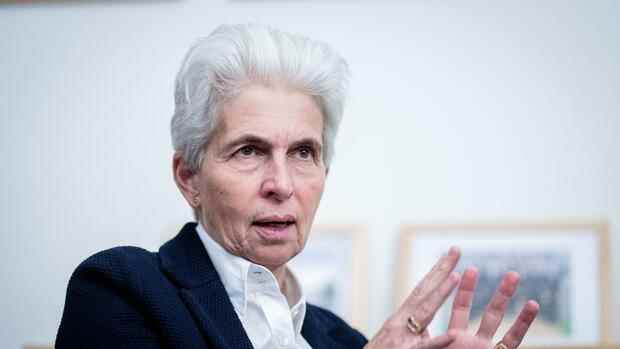Berlin The FDP defense expert Marie-Agnes Strack-Zimmermann has called for more speed in decisions on arms deliveries to Ukraine. The process of discussion must definitely be shortened, said the chairwoman of the Bundestag Defense Committee on Friday in the ZDF “Morgenmagazin”. “Russia won’t stop with the terrible attacks until we sort ourselves out here,” stressed Strack-Zimmermann.
The FDP politician welcomed the planned exchange of rings, i.e. the delivery of heavy weapons to other countries, which in turn will send heavy equipment to Ukraine in return. The idea came from the committee three weeks ago. But in war every day counts.
Strack-Zimmermann had invited Chancellor Olaf Scholz (SPD) to the committee. That was nothing unusual, emphasized the FDP politician. The then Chancellor Angela Merkel (CDU) was also a guest on the committee in 2016.
It was clear to her that Scholz had many appointments and wanted to fly to Japan on Wednesday, the actual day of the committee meeting. But she is confident that the committee visit will come, if not on that day, then on another.
Top jobs of the day
Find the best jobs now and
be notified by email.
Strack-Zimmermann also suggested examining what the Bundeswehr could still deliver. She mentioned, for example, technology for clearing the “rear front”, armored bridge-laying vehicles or protected vehicles for transporting soldiers.
Klingbeil defends Scholz’ Ukraine course
However, SPD chairman Lars Klingbeil vehemently supports Scholz. “I am very happy that we have a chancellor who thinks things through and coordinates closely with the international alliance partners,” said the SPD leader of the German Press Agency. “That’s what I expect from good leadership: No quick shots, but rather thoughtful, decisive and consistent action and not changing your mind every day or relying on nice headlines.”
Klingbeil sees the criticism from the ranks of the coalition partners as individual opinions.
(Photo: dpa)
But the pressure is also being maintained from the ranks of the coalition partner, the Greens, and from the opposition Union. The European Committee chairman in the Bundestag, Anton Hofreiter (Greens), confirmed in the newspapers of the Funke media group: “By slowing down the energy embargo and the necessary arms deliveries, there is a risk that this war will drag on for longer and that Putin will attack other countries will.”
At the same time, he assured that there was “no doubt whatsoever about Olaf Scholz’s chancellorship”. The security policy spokeswoman for his group, Sara Nanni, asked Scholz to position himself more clearly. “We need clarity from the Chancellor as to what the priorities are and how decisions are made,” she told the editorial network Germany.
At the same time, the Greens spoke out in favor of the immediate dissolution of the climate foundation set up by the Schwerin state government. “Nord Stream is dead. Now you can dissolve the state foundation immediately,” said the Greens’ federal chairman Omid Nouripour on Friday on Deutschlandfunk. Nouripour hopes this “happens as soon as possible”.
At the beginning of 2021, a climate foundation was set up in Mecklenburg-Western Pomerania to help complete the pipeline despite threats of US sanctions. As recently published documents show, Nord Stream 2 AG, with the Russian state-owned company Gazprom as the majority shareholder, was directly involved in the preparations for the foundation.
However, Klingbeil sees the criticism from the ranks of the coalition partners as individual opinions. “We work closely together in the government and in the coalition committee and stand together behind the decisions of the government. If there are individual differing opinions in the parties, then each party leadership has to take care of it themselves,” he told the dpa.
“Every day we reassess what we can still deliver. But the Bundeswehr has now largely exhausted its stocks,” he said. “This is also due to the fact that the Bundeswehr has been run down in recent years.”
Klingbeil pointed out that Germany instead finances deliveries of German industry to Ukraine with a lot of money and supports the provision of heavy weapons by partner countries with training and ammunition. He also urged prudence: “We agree with our partners that we must not cross the threshold to World War III.”
Although Germany has sent weapons to Ukraine, it has so far been reluctant to deliver heavy equipment such as tanks and artillery pieces – and according to information from “Welt” has not delivered anti-aircraft and anti-tank missiles since March 25.
In the meantime, however, Scholz has announced that Germany wants to provide compensation if NATO partners deliver old Soviet weapons to Ukraine. According to dpa information, Slovenia, for example, is to give up T72 tanks and receive German armored personnel carriers and wheeled armored vehicles in return.
More: Read the current developments in the Ukraine war in the live blog
